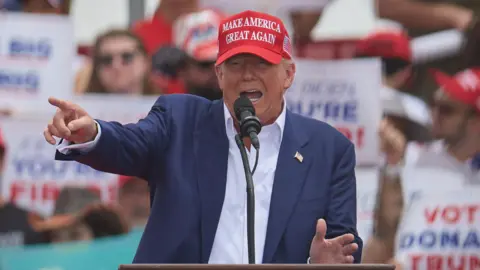Big oil uncovered
Leonard Leo-linked group attacking efforts to educate judges on climate
Rightwing US thinktank claimed in report that non-profit holding trainings is ‘corruptly influencing the courts’
A rightwing organization is attacking efforts to educate judges about the climate crisis. The group appears to be connected to Leonard Leo, the architect of the rightwing takeover of the American judiciary who helped select Trump’s supreme court nominees, the Guardian has learned.
The Washington DC-based non-profit Environmental Law Institute (ELI)’s Climate Judiciary Project holds seminars for lawyers and judges about the climate crisis. It aims to “provide neutral, objective information to the judiciary about the science of climate change as it is understood by the expert scientific community and relevant to current and future litigation”, according to ELI’s website.
The American Energy Institute (AEI), a rightwing, pro-fossil fuel thinktank, has been attacking ELI and their climate trainings in recent months. In August, the organization published a report saying ELI was “corruptly influencing the courts and destroying the rule of law to promote questionable climate science”.
ELI’s Climate Judiciary Project is “falsely portraying itself as a neutral entity teaching judges about questionable climate science”, the report says. In reality, AEI claims, the project is a partner to the more than two dozen US cities and states who are suing big oil for allegedly sowing doubt about the climate crisis despite longstanding knowledge of the climate dangers of coal, oil and gas usage.
In a PowerPoint presentation about the report found on AEI’s website, the group says the Climate Judiciary Project (CJP) is a “wholly aligned with the climate change plaintiffs and helps them corruptly influence judges behind closed doors”.
“Their true purpose is to preview the plaintiffs’ arguments in the climate cases in an ex parte setting,” the presentation says.
Both the report and the PowerPoint presentation link AEI to CRC Advisors, a public relations firm chaired by rightwing dark money impresario Leo. Given his outsize role in shaping the US judiciary – Leo helped select multiple judicial nominees for former president Donald Trump, including personally lobbying for Brett Kavanaugh’s appointment – his firm’s role in opposing climate litigation is notable.
“He was greatly responsible for moving our federal court systems to the right,” said David Armiak, the research director for Center for Media and Democracy, a watchdog group tracking money in politics, of Leo. CRC Advisors’ work with AEI, Armiak said, seemed “to delegitimize a group that’s seeking to inform judges or the judicial system of climate science, something that [Leo] also opposed with some of his other efforts”.
The AEI report’s document properties show that its author was Maggie Howell, director of branding and design at CRC Advisors. And the PowerPoint’s document properties lists CRC Advisors’s vice-president, Kevin Daley, as the author.
Neither CRC Advisors nor Leo responded to requests for comment.
In an email, the American Energy Institute CEO, Jason Isaac, said: “American Energy Institute employed CRC Advisors to edit and promote our groundbreaking report on the corrupt relationship between our federal court system and leftwing dark money groups.”
But Kert Davies, the director of special investigations at the non-profit Center for Climate Integrity, who shared the report and PowerPoint with the Guardian, said ELI is “far from leftwing”.
The institute’s staff include a wide variety of legal and climate experts. Its board includes executives from Shell Group and BP, oil companies who have been named as defendants in climate litigation, and a partner at a law firm which represents Chevron. Two partners with the law firm Baker Botts LLP, which represents Sunoco LP and its subsidiary, Aloha Petroleum Ltd, in a climate lawsuit filed by Honolulu, also sit on ELI’s leadership council, E&E News previously reported.
“ELI’s seminars are giving judges the ABCs of climate change, which is a complicated subject that they ought to know about,” said Davies. “The idea that they’re corruptly influencing the court from the left … is complete disinformation.”
Asked for comment about ELI’s connection to oil companies, the AEI CEO, Isaac, said that “all of those companies have embraced and/or are pushing political agendas” that are “contrary to the best interest of Americans, American energy producers, and human flourishing”, including environmental social and governance (ESG) investing and diversity, equity and inclusion (DEI).
“They are the appeasers, the ones feeding the crocodiles,” he said. He did not respond to questions about the extent of the relationship between AEI and CRC Advisors.
In a statement, Nick Collins, a spokesperson for ELI, called the AEI report “full of misinformation and created by an organization whose leadership regularly spreads false claims about climate science”, and described the CJP curriculum as “fact-based and science-first, developed with a robust peer review process that meets the highest scholarly standards”.
Pending climate litigation
AEI’s attack on the judicial climate education program comes as the supreme court considers litigation that could put big oil on the hook for billions of dollars.
Honolulu is one of dozens of cities and states to sue oil majors for allegedly hiding the dangers of their products from the public. Hawaii’s supreme court ruled that the suit can go to trial, but the defendants petitioned the US supreme court to review that decision, arguing the cases should be thrown out because emissions are a federal issue that cannot be tried in state courts.
This past spring, far-right fossil fuel allies launched an unprecedented campaign pressuring the supreme court to side with the defendants and shield fossil fuel companies from the litigation. Several of the groups behind the campaign have ties to Leo.
In June, the supreme court asked the Biden administration to weigh in on the defendants’ request. Biden officials could respond as soon as Monday.
“It’s doubtful that AEI’s timing of their report release was a coincidence,” said Davies.
The supreme court may weigh in on another case as early as Monday, too: in April, 20 Republican state attorneys general filed “friend of the court” briefs asking the supreme court to prevent states from being able to sue oil companies for climate damages. All of the signatories are members of the Republican Attorneys General Association, to which Leo’s Concord Fund is a major contributor.
CRC Advisors
In the weeks since its publication, AEI’s report attacking ELI has received a surge of interest from rightwing media. Fox News featured the report, as did an array of conservative websites. On Thursday, the Hill published an op-ed by Ted Cruz attacking the ELI project. Other rightwing groups have previously questioned the motives of ELI.
CRC Advisors has counted Chevron, one of the plaintiffs in Honolulu’s lawsuit, as a client. In 2018, the Leo-led PR firm also worked on a campaign aimed at exonerating the supreme court justice Brett Kavanaugh from accusations of sexual assault.
Davies said it “would not be surprising” if CRC Advisors had a “large role” in the creation or promotion of the AEI report attacking ELI’s judiciary trainings. “They’re known for running campaigns for corporate interests and rightwing interests,” he said.
American Energy Institute
In addition to his work with AEI, Isaac also serves as a fellow at Texas Public Policy Foundation – a thinktank backed by oil and gas companies which has recently garnered scrutiny for its role in drafting the ultraconservative policy playbook Project 2025.
A former Republican Texas state representative, Isaac has dedicated much of his career to disputing climate research and promoting misinformation to justify deregulation of the fossil fuel industry. Isaac recently responded to a Twitter post about Climate Week by the EPA, calling the conference on climate change “nothing more than a celebration of people suffering from mental illness, #EcoDysphoria, with those attending insisting the rest of us catch it.”
On a 25 September episode of the rightwing Wisconsin talk radio show The Vicki McKenna Show, Isaac offered a defense of the fossil fuel industry, describing oil and gas as keys to prosperity. “I live a high-carbon lifestyle,” he said. “I wish the rest of the world could, too.”
Formerly known as Texas Natural Gas Foundation, AEI on its face appears to contribute little more than public relations work in defense of the fossil fuels industry. The group publishes blogposts defending carbon emissions and denouncing the push for climate action. It has also produced a handful of longer reports promoting laws that restrict environmental, social and governance (ESG) investing and opposing the widespread adoption of electric vehicles.
Among AEI’s board members are Steve Milloy, who served on Donald Trump’s Environmental Protection Agency transition team, once ran a tobacco industry front group, and is a well-known climate denier. Milloy did not respond to a request for comment.
According to the group’s most recent tax filings, AEI, which lists four staffers and a CEO on its website, is not a lavish operation. The group brought in about $312,000 in revenue in 2022 and appears to fund its operations at least partly by selling merchandise – among other products, AEI offers T-shirts, tote bags and beer koozies emblazoned with the words “I Embrace The High Carbon Lifestyle”.




